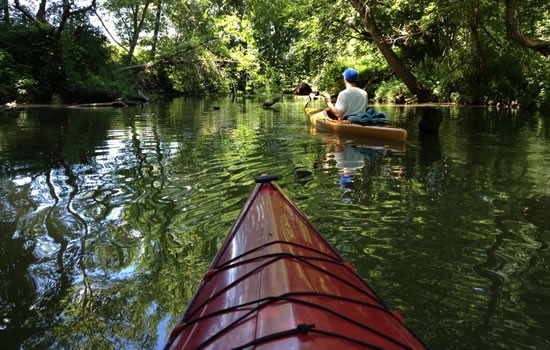― DEER ―
WHAM! It sounded like a tire blowing out - that or the car hit something really hard. I knew there was an accident because I heard a car horn blaring non-stop and someone hollering for help. Three girls had been coming home late at night, going fast, and hadn't seen the deer until it suddenly appeared right in front of them. No time to hit the brakes. The impact knocked the deer 50 feet up the road, crushed in the hood of the car, pushed the fan into the radiator, and nearly ripped off the front right wheel. The girls were lucky no one was injured. The deer died instantly. The car was undriveable.
This happens at least once every year on the road above our house. It's dark, the driver is going 60 miles an hour or faster, and the deer appears so suddenly that there's no time to stop. Last year in New York there were 8,570 reported deer/vehicle accidents (because only about 1/6 of such accidents is reported, the real number is closer to 50,000). Nation-wide, there are about 750,000 such accidents every year, with about 10,000 human injuries requiring hospitalization, and 150 human fatalities (many of them motorcyclists). Average cost of repair is $2,000 per accident.
Most of these collisions occur October-December when deer are breeding and hunting season is on: deer are moving more often and more recklessly. Peak hours for deer travel (and accidents) are dawn and dusk when deer are also harder to see.
Luckily, there was no one in the passenger seat in this accident. The deer jumped off an overpass.
How can you avoid hitting deer, or at least reduce your risk of damage or injury in a deer-car accident?
- Do not use the "deer whistles" sold at hardware stores and auto shops - they DON'T WORK and give a false sense of security.
- When driving after dark (and before dawn), especially in areas with forests or farmlands, slow down to 45 miles an hour. Even if you hit a deer, at this speed you'll do less damage to your car and be at less risk of injury or death. Avoid driving after dark in areas with high deer density. Be especially vigilant October-December.
- Drive with your high-beams on and continuously scan both sides of the road ahead: deer eyes shine when they look your way and are a sure sign of deer ahead. Slow down when you see deer eye-shine.
- Deer usually travel in family groups of three or more - if one crosses the road, slow down and look for the others.
- If you can't stop in time with your brakes - HIT THE DEER! Don't try to swerve off the road, or into the opposing lane - if you hit a tree or an on-coming car you'll cause more damage to your car and be more likely to be injured. Plus - hitting a deer on the road is a comprehensive loss, and your insurance rates should not go up. Go off the road, or hit an on-coming vehicle and the accident is a collision and your insurance rates will go up.
- If you do have to use your brakes, don't jam them but just try to slow down enough to miss the deer. Jamming on the brakes causes the nose of the car to dip down, increasing the chances of the deer coming through the windshield if you hit it.
- If you hit a deer, stop and check your car - you may have sustained enough damage to make driving hazardous. Check to make sure the wheels are straight and not flat, and that the fan is not jammed into the radiator. And leave the deer alone - you may be injured if you approach it or try to put it out of its misery. You are not required to report deer/car accidents but it's a good idea. Call the local sheriff, they'll know what to do.

